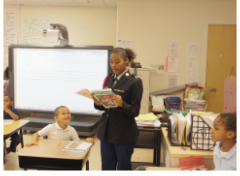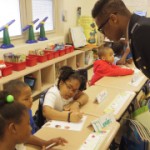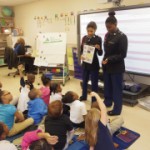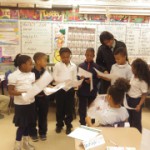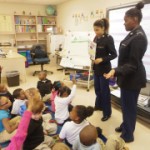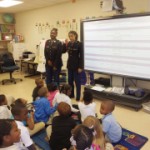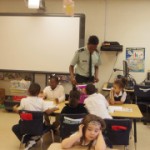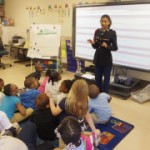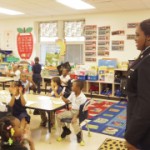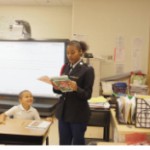by Jessica Jones
The ROTC students at Woodlawn High School partnered with Junior Achievement in a volunteer project in which the students taught Robinson Elementary Kindergartners, first and second graders in subjects of business, government and economics once a week. The students’ last session for the year was Mar.19, during which the Robinson students received diplomas and treats for completing their lessons.
During the sessions, the high school students taught lessons that were educational but also interactive. These collaborative activities were what Olive Blakney, a 9th grader at Woodlawn High School enjoyed about volunteering.
“I like working with the kids and us doing hands on activities,” she said. “We did a lesson with symbols and maps and we taught them about the symbols and the maps and the keys. We did a hands on activity where we had a map with a car and [the children] demonstrated North, South, East and West and they placed different businesses on the map. I liked that because we were actually hands on and the kids were engaged in the activity and they were excited to do it, so I really enjoyed that.”
The volunteering session wasn’t just an opportunity for the high school students to teach the elementary students, but it was also a chance for the teachers to learn. Roosevelt Smith, an 11th grader said while he’s the one teaching the class, he’s learned from the students as well.
“It’s shown me how to have confidence, teaching the kids about different activities such as starting a business. Helping out in the community is a great learning experience and they enjoy it.”
Major Amanda Bowman supervised the students as they taught lessons supplied by Junior Achievement. Second graders learned how to cast a ballot and make a decision as well as how to start a business. Lessons also included the importance of making money and using money wisely.
“[The students learned] how important it is to do a good job how you make money and, that you have to work and earn that money. Why do you need to make money? To buy the things that you need and want. We even teach them the difference between a need and a want. [We teach them] you earn your money, not just [have] mommy or daddy give you some money. It’s important that you work hard for what you get, and it’s very important that you work hard.”
The decision-making process is a learning experience for both the students and the cadets, Major Bowman said.
“It’s not just important for the little guys, but for my cadets to learn as well, because they go through the whole voting process from deciding on a candidate and deciding on all the different reasons why you want this particular thing over that particular thing, and voting for it,” she said.
Lessons weren’t limited to school subjects; the cadets also taught students about the importance of excelling in school by doing their very best and the consequences of not doing so and how it translates to life outside the classroom.
“You work hard, you do a good job you make a good grade and does that make you happy or sad? When we don’t do a good job, then there are consequences. [When you make bad grades are you] happy or not so happy? Mommy and daddy are not so happy. Teacher is not so happy because they want you to do a good job every single time and just like that [applies] to these babies it also [applies] to these cadets for them to do a good job and when you’re on a job, do the very best job you can do that’s going to equate to success happiness, a raise, everything that makes you happy.”
Giving the students role models that they can emulate is an additional objective that the program attempts to achieve, Major Bowman said.
“The children love it, and the goal is that these children will want to aspire to be like my cadets,” Major Bowman said. “[We want them to say,] ‘I want to grow up and get to high school and be successful in high school, and be in ROTC and graduate and get a diploma,’ and so they cover the whole spectrum.”
Just as the cadets learn from the experience of participating in the program, they also gain encouragement and recognition in a world that tends to highlight the negative rather than the positive.
“So many negative things are seen about our children when they do far more beautiful, positive things and this is one of them, so I just wanted everybody to see these children are doing a great job and they need to be rewarded.”

